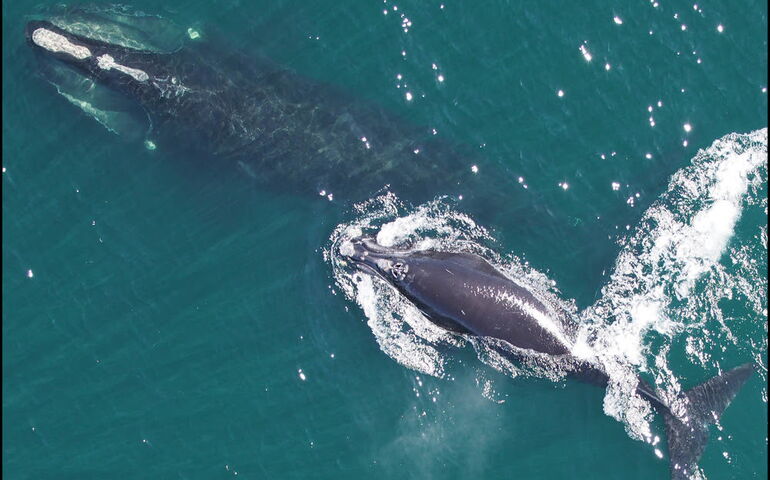For lobster industry, $82M right whale study grant is a hopeful sign
 COURTESY / NORTHEAST FISHERIES SCIENCE CENTER
The federal government has allotted $82 million to try to save the endangered North Atlantic right whale.
COURTESY / NORTHEAST FISHERIES SCIENCE CENTER
The federal government has allotted $82 million to try to save the endangered North Atlantic right whale.
The federal government recently announced it would invest $82 million in technology that may help save the endangered North Atlantic right whale — without resorting to cutbacks in Maine's lobster fishery.
A lobstering leader said the funding is a hopeful sign for the survival of both the whale and the industry.
“The right whale conservation plan cannot effectively balance the conservation of right whales with commercial fisheries and shipping interests without a better understanding of where and when these whales are most at risk,” Patrice McCarron, policy director for the Maine Lobstermen’s Association, told Mainebiz.
The association, she continued, has long been a champion of dedicating additional resources to right whale tagging and monitoring activities.
“MLA is hopeful that more robust data will replace the government’s overly pessimistic assumptions and provide a more accurate assessment of risk,” she said. “The MLA is committed to working with our members to ensure that the Maine lobster fishery continues to pose minimal risk to right whales.”
U.S. Department of Commerce and National Oceanic and Atmospheric Administration announced the funding last week. It is part of a $2.6 billion framework to invest in coastal resilience that NOAA announced earlier this year.
North Atlantic right whales are approaching extinction with fewer than 350 individuals remaining, including fewer than 70 females who are reproductively active.
The goal of the money is to address the primary threats to the species — entanglements in fishing gear and vessel strikes — with new technologies and approaches, including innovative solutions that minimize the impact on workers in marine industries, according to a news release.
Investment in technology
During the past decade, right whales have changed their distribution patterns, spending more time in areas with fewer protections from vessel strikes and entanglements.
“This funding allows us to invest in technologies to reduce the risk of vessel strikes, increase the use of on-demand fishing gear and improve enforcement of existing federal regulations,” said Janet Coit, assistant administrator for NOAA’s National Marine Fisheries Service.
The money will support the application of existing technologies — such as passive acoustic monitoring — and the development and implementation of technologies to enable vessels to detect and avoid North Atlantic right whales and other large whales.
The National Marine Fisheries Service will also develop and evaluate new technologies — such as those that use high-resolution satellite information — with the goal of improving right whale monitoring and the understanding of their distribution and habitat use.
The investment over the next three years will be as follows:
- Monitoring and modeling: $17.2 million for passive acoustic monitoring along the East Coast, $3.5 million for a satellite tagging monitoring program and $5.6 million for high resolution satellite artificial intelligence, totaling $35.8 million.
- Computer modeling advancements: $5.2 million.
- Vessel strike risk reduction efforts: $20.1 million, including $16.7 million for whale detection and avoidance technology development.
- On-demand fishing gear technology: $17.9 million.
- Enforcement efforts: $5 million for new equipment, technologies and operations.
In 2017, the National Marine Fisheries Service declared that the whale was undergoing an “unusual mortality event” that remains ongoing and includes 115 right whales that are deceased, seriously injured or in poor health.
In 2021, the service issued a 10-year plan that would require Maine’s lobster industry to implement a 90% reduction of the risk of fishing gear entanglement.
But the Maine Lobstermen’s Association has said there has never been a known right whale mortality associated with Maine lobster gear, and there has not been a single known right whale entanglement with Maine lobster gear in nearly two decades.
Earlier this year, the trade association won a lawsuit against the service to invalidate the plan, saying it would eliminate the fishery.
Maine lobstermen continue to fish under current whale protection rules while the service develops a new rule.













0 Comments